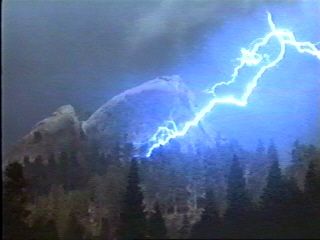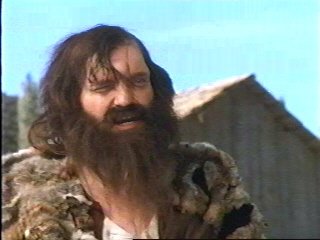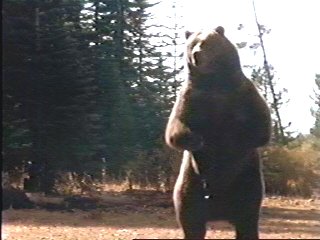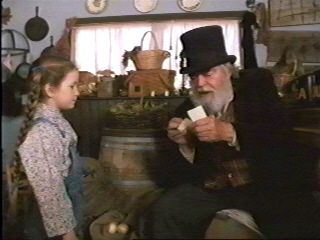
|
|
|
|
|
|
|
|
|
|
|
|
|
(1991) Director: James
Roberson
It goes without saying that whenever there is a mention of actor Richard Kiel anywhere, just about everyone will instantly think of his most famous role, as Jaws in the James Bond movies The Spy Who Loved Me and Moonraker. (Though according to a recent interview with Kiel, many young people nowadays recognize him because of his small role in Happy Gilmore.) Aside from those roles, I think it's safe to say just about anyone knows nothing else about Kiel. The main reason is simply that most of the movies he's been in over the years - among them Gus, Now You See Him Now You Don't, and The Las Vegas Hillbillys - have been pretty forgettable, and are not the kind of movies that generate star power or keep it strong. Though another reason is that in recent years he hasn't made that many appearances in movies and on TV, and the reason for that brings up some interesting personal facts about Kiel. A devoted Christian, he has spent a lot of his time with his faith and promoting it to others. Another passion of his is writing; for several decades he has not only written several screenplays, but has spent a great deal of time writing a biography of the controversial 19th century slave abolitionist Cassius Clay, which he hopes to eventually get produced as a feature film. So it will probably not come as a surprise that at least
one time he attempted to blend both of these deep devotions in a single
project. That project was the family movie The Giant Of Thunder
Mountain. Not only did Kiel star in the movie, he co-wrote the
screenplay and was one of the executive producers. Though the movie is
relatively wholesome in its tone and is well-meaning because of its
attempt to deliver a few messages - the main one being to show the
various evils that can come out of prejudice - when it comes to being
an entertaining romp or even at the level of a serviceable drama, it
ultimately fails at being both. However, the movie is
Though in real life the cowboy era was essentially dead by 1896, The Giant Of Thunder Mountain argues otherwise, at least in the small town of Weaverton, smack in the middle of the northern California wilderness. One piece of gossip that has been going around the town for years is the story of... well, the giant living on that nearby mountain mentioned in the title. The rumors range from this hermit giant being crazy to him having killed his parents years earlier. Naturally, the citizens of Weaverton that are most fascinated by these rumors are the children, and you know how it usually goes in stories aimed at children that center around a mysterious hermit. That's right, a child or children who desperately want to become members of a secret club (made up of snobbish peers that hold their meetings in a dilapidated clubhouse) have to pass an initiation ritual that will involve them getting into the general vicinity of the mysterious hermit. Though in this case the two brothers that are being initiated are just simply told to climb the mountain, where all they will have to worry about is the possibility of encountering the nasty and bloodthirsty grizzly bear (Bart the Bear, of The Bear and The Edge fame) that also lives there. Of course, during their trek they stumble across the giant's empty cabin, and they are scared off when the giant (played by... well, duh!) suddenly thud-thud-thuds home after a hard day of... well, whatever hermits do in the woods all day before making a lot of noise coming home. Due to circumstances both too boring and unbelievable to get into here, the boys make a return trip to the cabin. By now, you are probably wondering "Where is the pesky and precocious little sister that inevitably comes up in stories like this?" Well, even though there is indeed one and she turns out to be a major catalyst in the movie, she only makes a proper appearance at this point in the movie. Amy (played by Noley Thornton of Beverly Hills 90210) gets wind of their departure and quickly follow behind. And naturally, when she gets to the cabin and sees the giant, she instantly shows no fear of him in what is no doubt an homage (read: rip-off) of Frankenstein. If this particular giant immediately threw Amy in the water and started a rampage in the nearby rural town like Frankenstein's monster, this movie probably could have ended up being quite entertaining. But no; Amy befriends the giant (named Eli), and discovers the big scary giant is actually a lonely but otherwise normal guy (barring little things like hinted alcoholism and various childhood traumas that lead him to live life in isolation.) Of course, if the movie had just stayed with the
developing friendship between Eli The primary conflict in The Giant Of Thunder Mountain is equally unbelievable in how it's unchallenged, and also could easily have been resolved if someone just said something. The conflict originates from the shifty character of Hezekiah (Elam, a veteran at playing old shifty coots in westerns) who runs - yup, that traveling carnival - with his two equally shifty sons played by William Sanderson (Lonesome Dove) and B movie actor George "Buck" Flower. When they get wind that Eli has a stash of gold in his cabin, they naturally come a-knocking when he's not around. As it turns out their presence at Eli's cabin at that moment, along with a few unbelievable coincidences that just happen at the same time there and elsewhere, Eli quickly finds himself a wanted man, and soon finds himself being hunted down by several dozen bloodthirsty gun & torch-wielding vigilantes. At one point he even gets a big blood-splattering bullet wound to the leg, no doubt in an attempt to give the watching kiddies some extra spice. Or maybe it was an attempt to try and distract any kids with reasonable intelligence from thinking about not only how unbelievable it is how Eli got into this situation, but how long he finds himself in this situation. When Amy flees from the attacking grizzly bear and runs in tears to her mother, what does she say happened to her? During her hysterical rant, Amy utters "He tried to attack me." Not "The grizzly bear", but "He". So of course, mother thinks Eli attacked Amy, tells the townspeople this, and... sigh. Incredibly, when mother thinks that Eli attacked Amy,
Amy does nothing to try and correct her at the time. And it's
only much later that Amy takes an attempt to try and tell her mother
the truth, but busy mother There is, in fact, a strong feeling of helplessness in this movie, as if everyone involved were all clinging to the screenplay because they were unable to make any kind of personal contribution. Playing Amy's mother, Hee Haw regular Marianne Rogers isn't in a position to try to attempt any humor (not that her cornpone humor would have improved things), so she just ends up standing around. And since you can't expect comedian Foster Brooks to put on his famous drunk act in a film of this nature, he ends up contributing as much as Rogers. As for Kiel's performance, well, for better or for worse like in pretty much every other movie he's been in, he is basically playing Richard Kiel. It's not like a more professional actor could have added much more to this part, because Kiel hasn't written Eli to be much more interesting apart from the fact he's tall. With the exception of a moment where Eli recalls what happened to him when he went into town when he was twelve years old (brief but very memorable), we really don't learn much about him at all, at least enough so he can firmly become the sympathetic central character this movie needs. In fact, the other characters in the movie are all so poorly written so they either come across as familiar stereotypes or little better than stock characters. It's not just the actors that seem unable to make
anything work with what they've
Check for availability on Amazon (VHS) See also: Escape To Grizzly Mountain, Hysterical, White Wolves |
 not a
total loss; among other things, it manages to answer a few questions.
Among other things, it suggests why that, apart from this screenplay
and his autobiography Making It Big In The Movies, Kiel
previous scripts and manuscripts have remained unsold. The end results,
which include some apparent desperate post-production tinkering that
will be later discussed, also give plenty of evidence to suggest why
upon completion, the movie was subsequently shelved for several years
before its near-invisible theatrical release. Still, if you for some
reason have a desire to penetrate the psyche of Richard Kiel, this
movie will be the best opportunity for you to do so.
not a
total loss; among other things, it manages to answer a few questions.
Among other things, it suggests why that, apart from this screenplay
and his autobiography Making It Big In The Movies, Kiel
previous scripts and manuscripts have remained unsold. The end results,
which include some apparent desperate post-production tinkering that
will be later discussed, also give plenty of evidence to suggest why
upon completion, the movie was subsequently shelved for several years
before its near-invisible theatrical release. Still, if you for some
reason have a desire to penetrate the psyche of Richard Kiel, this
movie will be the best opportunity for you to do so. and Amy, as well as
Amy's attempts to break Eli out of his self-protective shell, it would
have been pretty boring. So conflict gets thrown in along the way, but
it's of such a brainless and contrived nature that in the end I have to
wonder if taking the boring route would have been less painful. The
first incident of trouble comes when Amy escorts the reluctant Eli to
the carnival in time, and while playing one of the test-your-skill
games on the sidelines Eli discovers that the proprietor has
dishonestly set up the game. Eli understandably gets mad once he
discovers this, and when he starts being stern with the proprietor, the
nearby townspeople immediately become hostile to him, feeling that Eli
is simply bullying the crook. (Which soon leads to catcalling and
insults, along with the frequently parodied device of filming laughing
people's faces up close with a distorted lens.) Let me ask you this: If
you were Eli or Amy, what would you do in this situation? That's right,
you would speak up to defend and justify your actions, or at the very
least unveil the proprietor's crooked scheme right in front of
everyone. Incredibly, neither Eli or Amy even attempt to do
any one of those two things. Though I admit that Eli's subsequent "I
don't need any of you! This is why I live alone!" monologue before
storming off, and the shamed reaction of the townspeople to this are
both not badly executed at all, the fact that Eli and Amy didn't
previously do the most obvious and natural thing in the situation is so
unbelievable that the little good will found here in the end just seems
as artificial as their reactions.
and Amy, as well as
Amy's attempts to break Eli out of his self-protective shell, it would
have been pretty boring. So conflict gets thrown in along the way, but
it's of such a brainless and contrived nature that in the end I have to
wonder if taking the boring route would have been less painful. The
first incident of trouble comes when Amy escorts the reluctant Eli to
the carnival in time, and while playing one of the test-your-skill
games on the sidelines Eli discovers that the proprietor has
dishonestly set up the game. Eli understandably gets mad once he
discovers this, and when he starts being stern with the proprietor, the
nearby townspeople immediately become hostile to him, feeling that Eli
is simply bullying the crook. (Which soon leads to catcalling and
insults, along with the frequently parodied device of filming laughing
people's faces up close with a distorted lens.) Let me ask you this: If
you were Eli or Amy, what would you do in this situation? That's right,
you would speak up to defend and justify your actions, or at the very
least unveil the proprietor's crooked scheme right in front of
everyone. Incredibly, neither Eli or Amy even attempt to do
any one of those two things. Though I admit that Eli's subsequent "I
don't need any of you! This is why I live alone!" monologue before
storming off, and the shamed reaction of the townspeople to this are
both not badly executed at all, the fact that Eli and Amy didn't
previously do the most obvious and natural thing in the situation is so
unbelievable that the little good will found here in the end just seems
as artificial as their reactions. just dismisses her
by uttering "Hush!" Even kids at this point will be wondering why Amy
doesn't just scream, "I WAS ATTACKED BY A FREAKING BEAR, YOU IDIOT!"
The movie seems not only unable to generate a conflict by introducing
twists that feel more natural, but it has an inability to bring any
conflict to a satisfactory conclusion. There's that whole subplot about
the bear, for one thing. Though there is plenty of talk about how mean
this killer bear is, and it is revealed that it was the bear that
killed Eli's parents and has been stalking him all these years, this
bear situation is never resolved. At the end, the bear is
still around, and so are Eli's apparent inner demons surrounding this
bear. The resolution of the main plot concerning the persecution of Eli
is equally unsatisfying. Eli's final action is actually more believable
than what you might be expecting, especially for a movie like this. But
it's the characters of the townspeople who are at fault here. They are
made to put on plastic smiles and say kind things, and it comes across
as extremely phoney and forced; you can't buy it. These people aren't
characters having a change of heart, they are just a bunch of stock
characters acting out what the screenplay tells them to do what they
can't think on their own.
just dismisses her
by uttering "Hush!" Even kids at this point will be wondering why Amy
doesn't just scream, "I WAS ATTACKED BY A FREAKING BEAR, YOU IDIOT!"
The movie seems not only unable to generate a conflict by introducing
twists that feel more natural, but it has an inability to bring any
conflict to a satisfactory conclusion. There's that whole subplot about
the bear, for one thing. Though there is plenty of talk about how mean
this killer bear is, and it is revealed that it was the bear that
killed Eli's parents and has been stalking him all these years, this
bear situation is never resolved. At the end, the bear is
still around, and so are Eli's apparent inner demons surrounding this
bear. The resolution of the main plot concerning the persecution of Eli
is equally unsatisfying. Eli's final action is actually more believable
than what you might be expecting, especially for a movie like this. But
it's the characters of the townspeople who are at fault here. They are
made to put on plastic smiles and say kind things, and it comes across
as extremely phoney and forced; you can't buy it. These people aren't
characters having a change of heart, they are just a bunch of stock
characters acting out what the screenplay tells them to do what they
can't think on their own. been given, but in
the direction as well. It seems at times James Roberson (
been given, but in
the direction as well. It seems at times James Roberson (